HubSpot vs WordPress: Choosing the Right CMS

On this page
(last updated November 15, 2022)
If you're thinking about launching or rebuilding your website, you're facing a big question: which Content Management System (CMS) platform will you use to build your site.
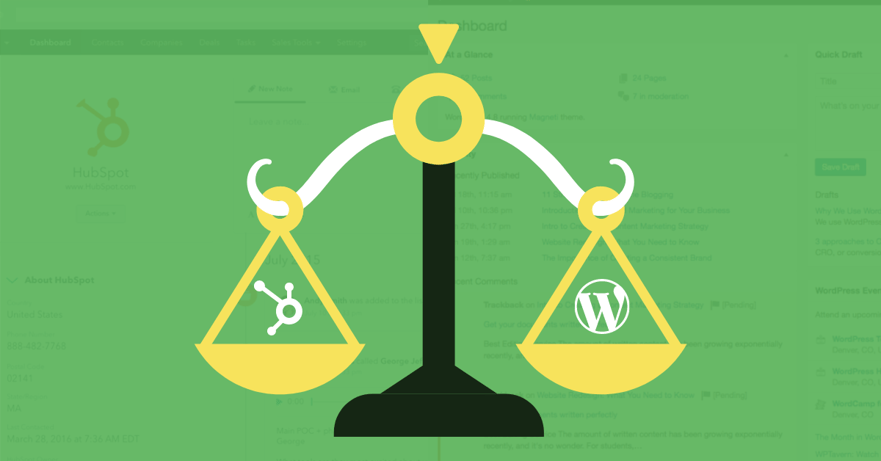
Every CMS comes equipped with its own capabilities and design, so it’s important to align your website goals to reduce design and maintenance overhead and give you the freedom to produce targeted, optimized content with an intuitive design.
The two most popular CMS platforms are HubSpot CMS and WordPress, so let's take a look at the two in-depth to help make your evaluation and see which one comes out on top.
HubSpot CMS
With a traditional CMS, you’re worried about the security and performance of your website. Not if your site is built on HubSpot CMS.
Built with both marketers and developers in mind, HubSpot CMS is a powerful tool with the features you need to create unique websites focused on the customer experience.
HubSpot empowers you to use customer data to build personalized, sophisticated experiences and keep your messaging consistent across all touchpoints.
And that’s only the beginning. Check out the top benefits of HubSpot CMS covered in-depth.
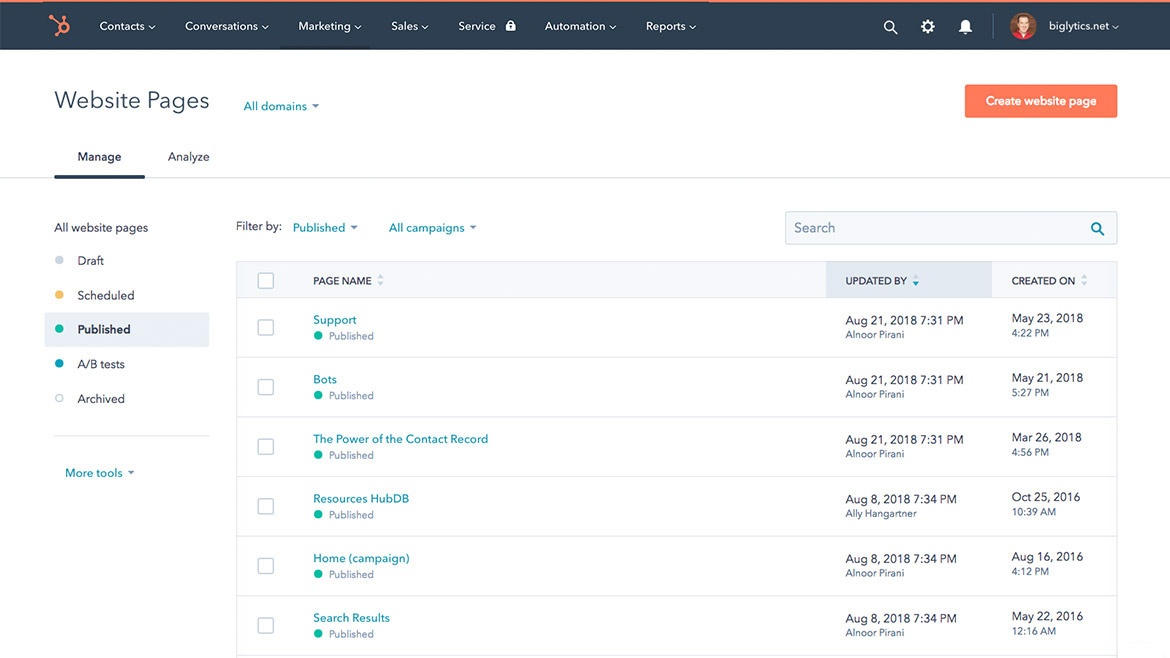
WordPress
While WordPress started as a blogging tool, its website builder has been the default choice of most businesses because it was the only free choice for quite some time. Because of this, it carries 43% of all websites on its platform.
It allows you to get a website up and running with minimal investment because it's supported by thousands of developers with custom plugins, themes, and other tools to help you start an inbound marketing program.
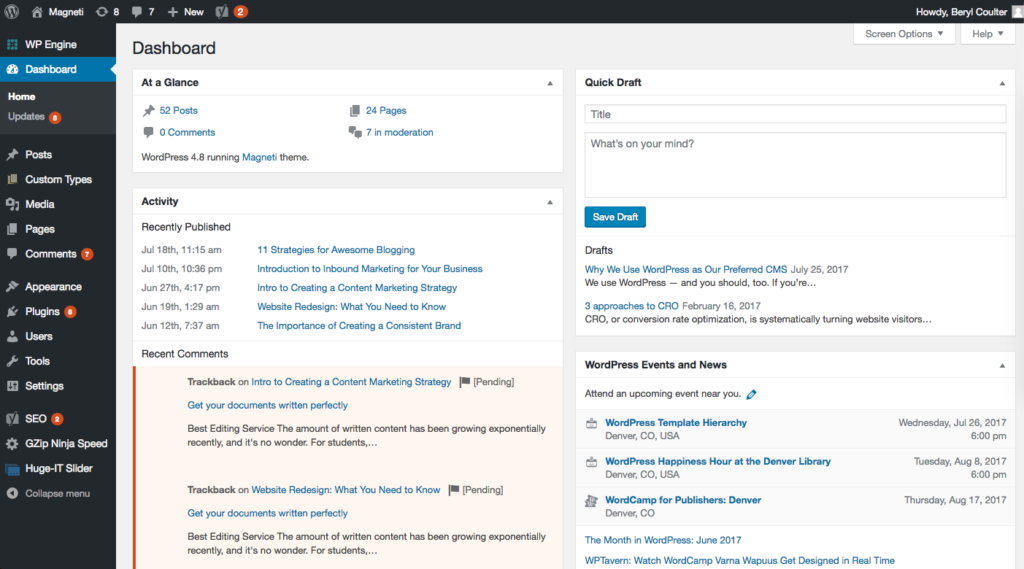
Who Comes Out on Top?
Now that you have an idea of the two platforms, let's dive deeper into some key functions you would be using on a regular basis with your business website.
User-Interface
HubSpot - If you’ve ever created a website page, you know the pain of trying to get the page to look exactly how you want.
With HubSpot's drag-and-drop editor, you can update and create pages without a developer’s custom code.
HubSpot also offers a staging platform, so you can view pages live before posting (critical for catching those last-minute errors!), and it enables you to add many features such as smart content, CTAs, and forms for conversion.
WordPress - Your website’s design begins with the theme you choose, and there are thousands of themes within WordPress, paid and free, that make customization possibilities endless.
However, without using a theme or plugin, WordPress does not have an easy way of editing templates or building a custom page layout. If you are on the fence with a design aspect, it’s necessary to have a trusted web developer (like ours) in your corner.
Blogging
HubSpot - The blogging functionality (like the rest of the platform) is built with SEO in mind and is constantly updated to comply with Google’s latest algorithm changes. HubSpot CMS prompts you to use SEO best practices such as adding meta descriptions, tags, and alt text to images to help your blog content rank better with Google.
The easy-to-use interface enables you to write, optimize, publish, and analyze blog content all in one place.
As well, its advanced reporting tool makes it easy to evaluate the impact of your content. Speaking of impact, HubSpot allows you to boost your content via social media and email marketing, popular features we use daily.
WordPress - Its blogging feature is one of its greatest strengths because of how quickly and easily you can create content on the interface. With a range of tools for media creation, storage, and management, you can start blogging using themes from WordPress.
However, depending on the theme or template selected, it’s advisable to use a developer to make any layout changes or edits. Additional plugins are available to help you optimize your content for SEO purposes, like having a more modern formatting style and CTAs.
Landing Pages
HubSpot - With a landing page tool that allows for easy page creation and customization, HubSpot features a full suite of tools you need to publish, tailor, and optimize a page that is available at your fingertips.
Also, every template is mobile optimized and supports the drag-and-drop feature we mentioned earlier for easily changing the layout of pages without any developer required.
WordPress - Creating a landing page has a similar process to creating a blog post if you are simply adding text content or images. However, if you want to alter the layout of the page, it may require a developer to edit an existing template or create a new template from scratch.
SEO
What good is a website if it's never seen?
HubSpot - When it comes to SEO, HubSpot really shines. Every blog, landing page, and website page editor offers built-in, on-page SEO tools to optimize every piece of content you add to your website.
With its integrated tips, HubSpot helps you tweak and complete the right fields as you are building out your content so you can align with what Google favors in ranking.
WordPress - To optimize your SERP ranking on WordPress, you need to download an SEO plugin because it doesn’t come with native SEO functionality. With several plugins, that means more software management and cost when it comes to maintaining your website.
Analytics (Data)
HubSpot - Website data is the most important tool for any marketing team. HubSpot’s first-party cookie analytics are complete and easy to grasp, especially when used with other HubSpot Marketing hub features.
HubSpot’s analytics (which we love so much) give you an all-in-one solution where you can start tracking your visitors immediately.
WordPress - Since it has no built-in analytics features, you're required to use plugins, which means you have to get into 3rd-party tools such as Google Analytics. And remember, too many plugins on your website can create compatibility and security issues.
Security
HubSpot - If you’re running a B2B website, security should be one of your main concerns.
Website security with HubSpot is top-notch, and it's less prone to attacks due to its robust internal structure.
Not only does HubSpot have extraordinary measures in place for website protection, but SSL is also included with HubSpot, which ensures that any data entered is protected.
WordPress - Since this platform is an open-source system, there will always be many security risks, and relying on a developer is crucial to stay updated quickly.
You’ll be responsible for your own security and maintenance because WordPress doesn't offer any built-in security measures. Still, in terms of 3rd-party security, there are some options, such as WP Engine, which specialize in high-security WordPress hosting.
The Verdict
Since HubSpot CMS is now free to download and use (so, the price is no longer a factor between the two), HubSpot CMS is hands down the best choice.
Why? For the SEO and security alone. Because there's nothing more important than promoting and protecting your website.
As a HubSpot Platinum Solutions Partner, we sit firmly within the HubSpot ecosystem, and we're pros at migrating your existing website from WordPress to HubSpot CMS or building you a new 24/7 sales machine altogether.
If you’re looking toward a modernized digital marketing strategy, chat with our team. We're right here.
Explore More Insights: Related Blog Posts
-
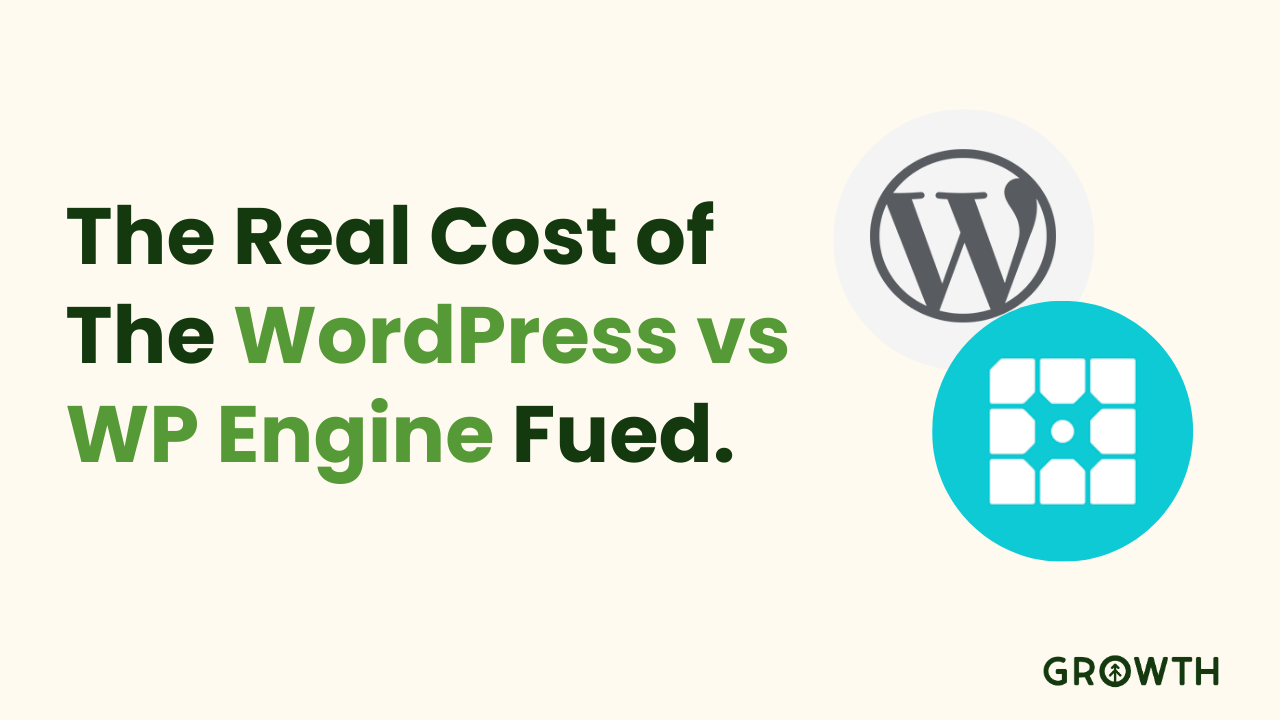 Website DevelopmentOct 9, 2024
Website DevelopmentOct 9, 2024 Growth Marketing Firm
Growth Marketing FirmThe Real Cost of the WordPress vs. WP Engine Feud
The WordPress vs. WP Engine feud isn’t just tech industry gossip; it’s a real mess, and it’s starting to...
-
 Website DevelopmentJan 13, 2022
Website DevelopmentJan 13, 2022 Growth Marketing Firm
Growth Marketing FirmTop 10 Benefits of HubSpot CMS
(Last updated February 24, 2023) A Content Management System (CMS) is a software application that allows you...
-
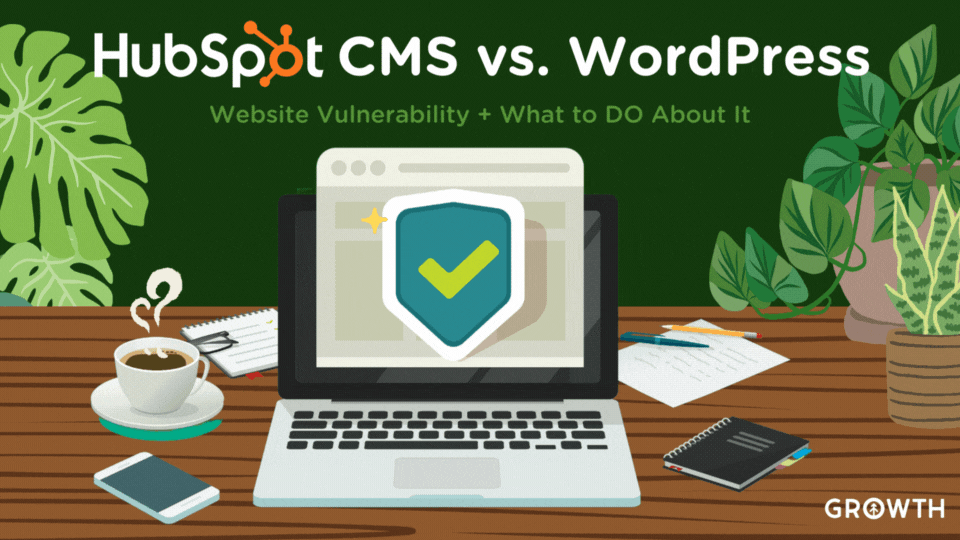 Website DesignApr 17, 2023
Website DesignApr 17, 2023 Growth Marketing Firm
Growth Marketing FirmHubSpot CMS vs. WordPress
Ongoing security challenges face websites built on WordPress, and more website owners are looking for...
-
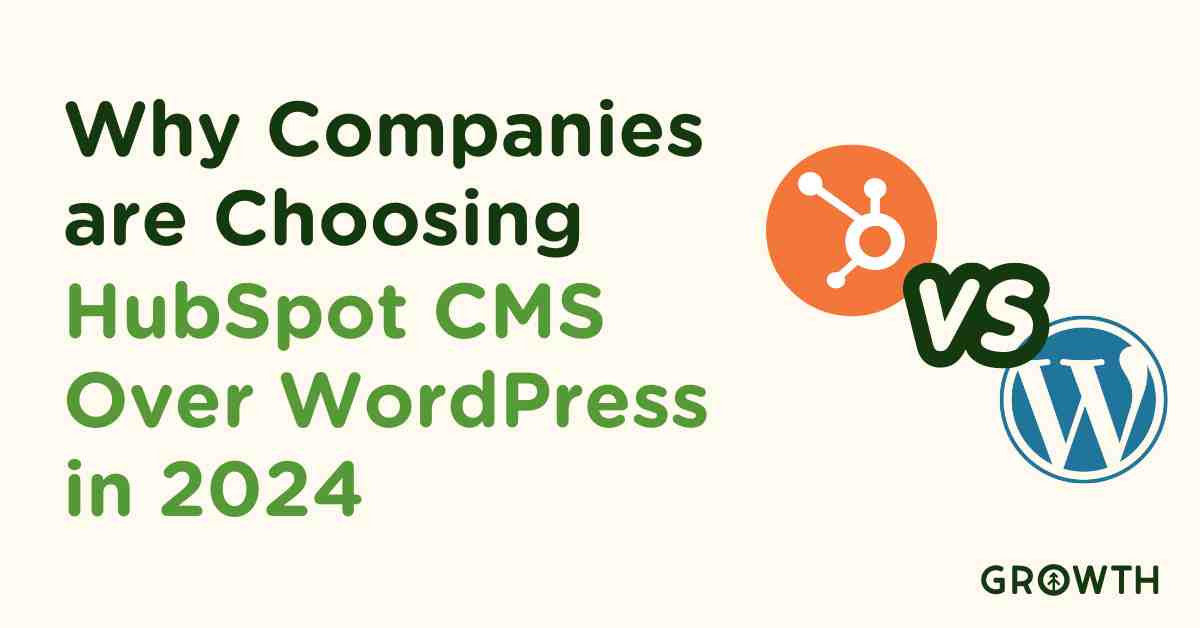 Website DesignFeb 28, 2024Rick Barcellos
Website DesignFeb 28, 2024Rick BarcellosWhy Companies are Choosing HubSpot CMS Over WordPress in 2024
In the digital age, the choice of a content management system (CMS) can significantly influence your online...
-
 Website DesignMar 21, 2025Rick Barcellos
Website DesignMar 21, 2025Rick BarcellosThe Top 3 Ways to Get More Value from Your HubSpot CMS Theme
So, you've downloaded our Redwood Industrial Theme for HubSpot's Content Hub, you should already know that...
-
 CRMJan 7, 2022
CRMJan 7, 2022 Growth Marketing Firm
Growth Marketing FirmHubSpot for Manufacturing
If you’re a brand new HubSpot user or shopping for the best CRM to help you grow your manufacturing business,...
-
 CRMAug 26, 2024
CRMAug 26, 2024 Jason Gless
Jason GlessA Beginner's Guide to HubSpot: What to Expect During Your Onboarding
So, you’ve just purchased HubSpot—a major step toward streamlining your marketing, sales, and customer...
-
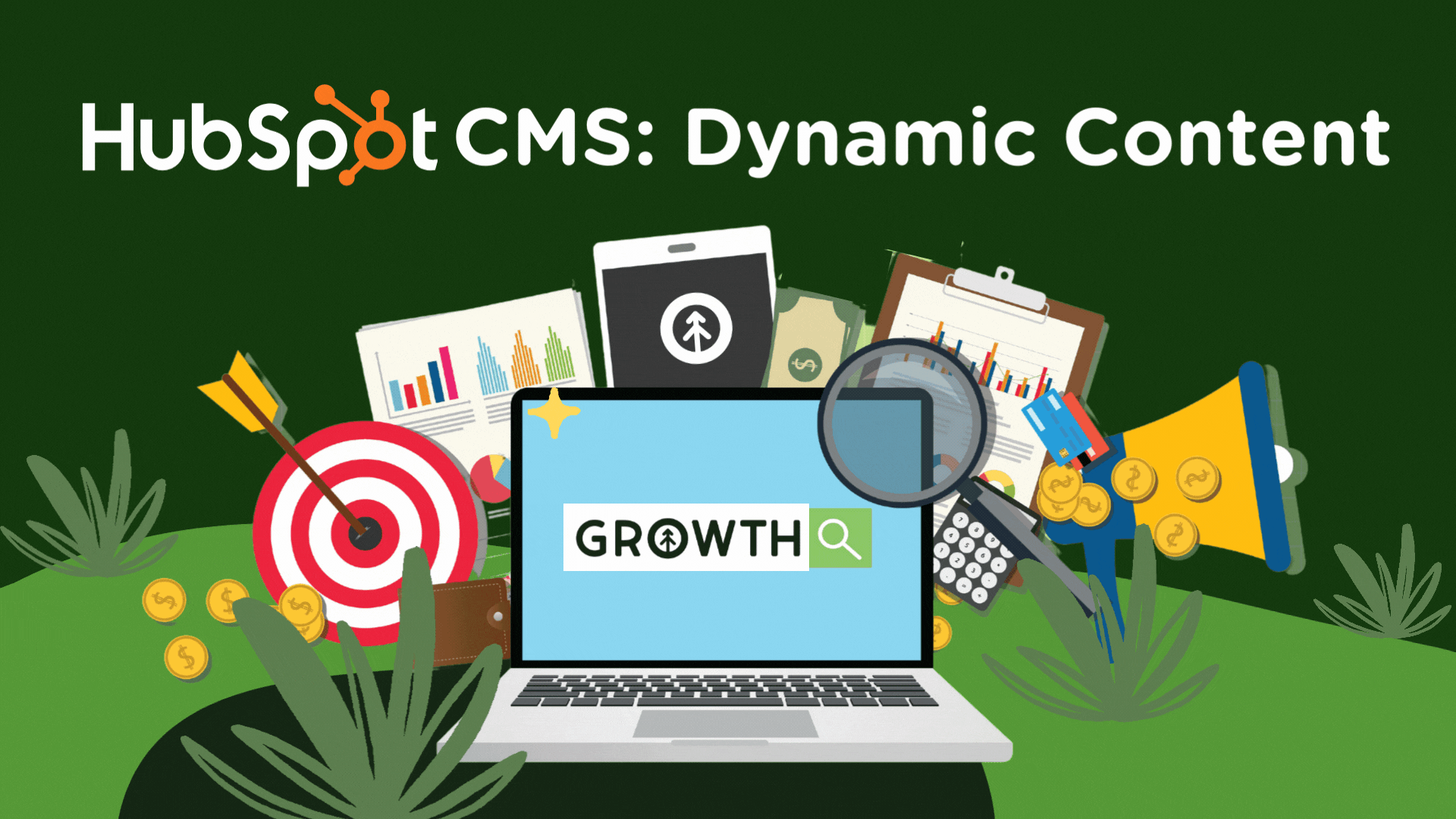 Inbound MarketingMar 9, 2023
Inbound MarketingMar 9, 2023 Growth Marketing Firm
Growth Marketing FirmHubSpot CMS: Dynamic Content for Personalized Website Experiences
Providing a personalized website experience for customers and visitors has become a crucial aspect of...
-
 HubSpotNov 3, 2022
HubSpotNov 3, 2022 Growth Marketing Firm
Growth Marketing FirmCMS Migration: Why Businesses Are Making the Move to HubSpot
HubSpot CMS—a powerful, cloud-based website platform—not only increases the ROI of website design,...

